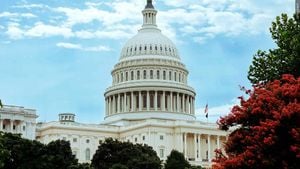The National Health Service (NHS) of the United Kingdom, celebrated for its commitment to provide free healthcare to citizens, is currently facing several serious challenges. These have been exacerbated by the Covid-19 pandemic, shifts in public health policy, funding discrepancies, and rising patient demand.
At the heart of the NHS's troubles is the issue of funding. Years of austerity measures following the 2008 financial crisis led to cuts affecting many public services, including healthcare. Critics have long claimed these budget constraints have resulted in staff shortages, longer waiting times, and compromised quality of care. According to some reports, the NHS has been managing with fewer resources even as demand increases, leading to concerns about sustainability.
Staffing shortages have pushed the system to its limits. It's estimated the NHS is short by approximately 135,000 staff members, including doctors and nurses, which has directly impacted patient care and service delivery. Volunteers and temporary personnel have been used to fill gaps, but they often cannot match the expertise and continuity of dedicated full-time staff. The NHS faces significant hurdles, such as high burnout rates, which are common among medical professionals due to the extreme demands placed upon them.
Long wait times for patients have become notoriously problematic, culminating in backlogs affecting millions. For example, the median waiting time for patients referred by their general practitioners to see specialists rose sharply, frustrating individuals and families who rely on timely access to healthcare services. Many individuals are left waiting for months, sometimes even years, for necessary surgeries and treatments, which understandably puts additional strain on patients and their loved ones.
Besides the growing demand on resources, the NHS is confronting systemic issues related to access and equity. Those living in rural areas often find themselves at even greater disadvantage than their urban counterparts—health services can be sparse, resulting in increased travel time to access care. Issues with transportation access and distance from medical facilities limit healthcare access for many, leading to disparities based on geography.
Further complicity arises from the aging population, which contributes to heightened need for chronic disease management and specialized care. Approximately 18% of the UK population is aged over 65, and this demographic is more likely to require regular healthcare services. Each person living longer brings on challenges of sustaining and developing services catered to the elderly, which adds layers of complexity to NHS planning.
Politically, the NHS has been the subject of dispute between parties. Government officials often tout investment levels, yet critics argue these investments do not reflect the scale of challenges facing the service. Calls for significant reform and prioritization of public health spending have sparked debates about future funding models and accountability measures.
Over the years, private health companies have offered to ease the burden on the NHS through partnerships. While it's argued this could expand capacity, critics worry it may lead to the erosion of the principles on which the NHS was built, namely, universality and free provision. Such developments raise questions about the long-term future of publicly funded healthcare.
Looking forward, the NHS faces the challenge of adapting to changing times without losing the core values of its founding. It needs to embrace technology and innovation, including telehealth services and digital platforms. This modern approach could streamline processes and improve accessibility, especially for those who may find it challenging to physically visit healthcare facilities.
Despite the hurdles, there remains hope among healthcare workers and patients. Many are actively advocating for change and modernization to make the NHS more resilient. A key aspect will be increasing clarity during crisis moments so the public can be informed about what steps are being taken to improve care.
The NHS, emblematic of British identity, is at a crossroads. Will it transform to meet modern demands, or will it succumb to prolonged struggles? Time will tell, but with concerted effort, advocacy, and commitment to its core values, the NHS can emerge strengthened for future challenges.



